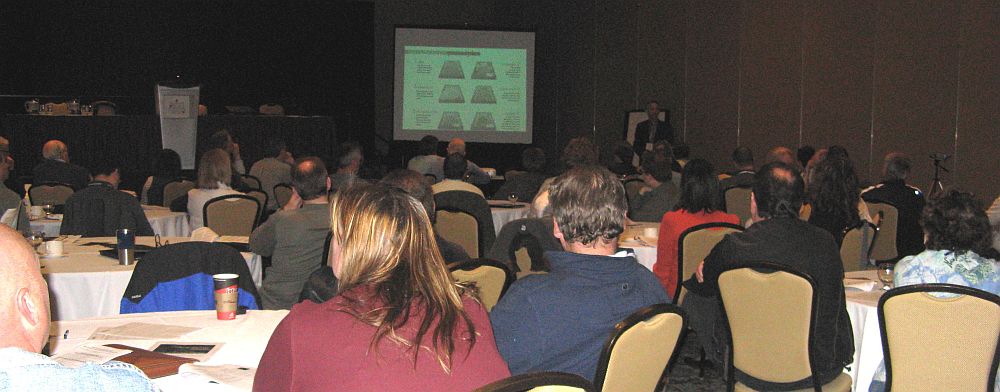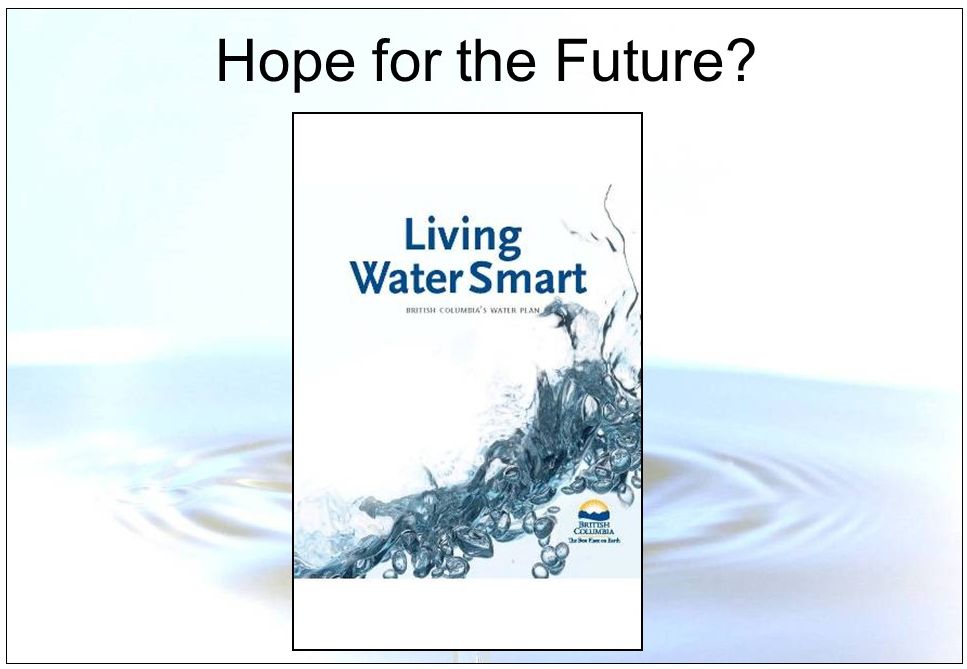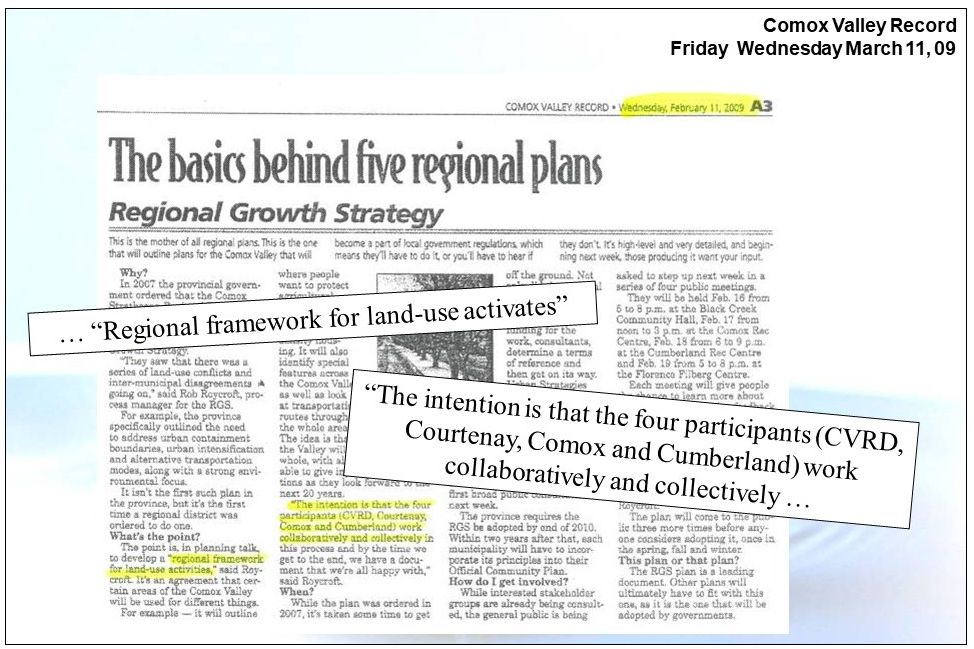CONVENING FOR ACTION IN THREE REGIONS: “Smart Planning and Living Water Smart: Approaches and Tools for Doing Business Differently in British Columbia” – hosted by three provincial ministries, the 2009 Penticton Forum showcased the work of the Comox Valley Regional Team
Note to Reader:
In April 2009, the Penticton Forum showcased three regions — Okanagan, Vancouver Island and Metro Vancouver — where communities were ‘convening for action’ and embracing a ‘regional team approach’ to make a difference. Each regional initiative was developing a vision and road map to change the way that land is developed and water is used.
The Forum was held as an adjunct to the Annual Conference of the BC Water & Waste Association, and was hosted by the Okanagan Basin Water Board and three provincial ministries (Environment, Agriculture, and Community Development). The Forum attracted close to 80 participants from communities around the province, including a contingent of Okanagan elected representatives.
The ‘Penticton Forum’ was titled Smart Planning & Living Water Smart: Approaches and Tools for Doing Business Differently in BC. This choice of title reflected and integrated provincial initiatives then underway.

Build a Vision, Create a Legacy
 “In 2009, our Convening for Action vision in organizing the Penticton Forum was that this flagship event would prove to be a transformational event that inspires participants to do better. Creating a lasting legacy requires sustained commitment to make things happen. The Penticton Forum was not the be-all and end-all; rather, it was an important milestone in advancing a regional team approach that aligns local actions with provincial goals for the common good,” recalls Kim Stephens, Executive Director of the Partnership for Water Sustainability in British Columbia. He was the Forum Moderator.
“In 2009, our Convening for Action vision in organizing the Penticton Forum was that this flagship event would prove to be a transformational event that inspires participants to do better. Creating a lasting legacy requires sustained commitment to make things happen. The Penticton Forum was not the be-all and end-all; rather, it was an important milestone in advancing a regional team approach that aligns local actions with provincial goals for the common good,” recalls Kim Stephens, Executive Director of the Partnership for Water Sustainability in British Columbia. He was the Forum Moderator.
Convene for Action in British Columbia
The Penticton Forum showcased how partnerships, collaboration, innovation and integration were helping local governments in the three regions — Vancouver Island, Okanagan and Metro Vancouver — make the best choices for living water smart. Communities are ‘convening for action’ and embracing a ‘regional team approach’ to make a difference. Each regional initiative was responding to this challenge:
How do we align our efforts at three scales – provincial, regional and local – to do business differently, prepare communities for change, and choose to be water smart?
“Creating a lasting legacy means bringing together those who plan and regulate (local government), those who build (developers), those who provide the legislative framework (the Province), those who do research (universities and colleges), and those who advocate conservation of resources (the stewardship sector). We describe this as the regional team approach,” emphasized Kim Stephens.
To Learn More:
To download the Agenda, click on Lesson Plan – Draft Outline of What We Want to Achieve.
Provincial Government Circular
In March 2009, the Ministry of Community Development sent out a circular to all Municipal and Regional District Chief Administrative Officers, Engineers and Planners regarding Smart Planning & Living Water Smart: Learn About Approaches and Tools for Doing Business Differently. The circular explained how a number of provincial initiatives support and/or complement each other.
 “On April 29 in Penticton, the Ministry of Community Development is co-hosting a forum to showcase how partnerships, collaboration, innovation and integration are helping local governments in the Okanagan, Vancouver Island and Metro Vancouver make the best choices for sustainable, healthy and vibrant communities. Each regional initiative is developing a vision and road map for achieving settlement in balance with ecology,” wrote Glen Brown, Executive Director, Local Government Infrastructure and Finance.
“On April 29 in Penticton, the Ministry of Community Development is co-hosting a forum to showcase how partnerships, collaboration, innovation and integration are helping local governments in the Okanagan, Vancouver Island and Metro Vancouver make the best choices for sustainable, healthy and vibrant communities. Each regional initiative is developing a vision and road map for achieving settlement in balance with ecology,” wrote Glen Brown, Executive Director, Local Government Infrastructure and Finance.
“Titled Smart Planning & Living Water Smart: Approaches and Tools for Doing Business Differently in B.C., the ‘Penticton Forum’ is an adjunct to the annual conference of the B.C. Water & Waste Association (BCWWA). Organized by the BCWWA Water Sustainability Committee in collaboration with the Okanagan Basin Water Board and three provincial ministries (Community Development, Environment, and Agriculture and Lands), the forum program is designed to advance a ‘regional team approach’.
“The forum program is organized as four modules and is built around two themes that are intertwined, namely: ‘creating our future’ and ‘doing business differently’.
“The Penticton Forum supports and/or complements various provincial initiatives, notably: Living Water Smart, the Green Communities Initiative, A Guide to Green Choices and Beyond the Guidebook. Collectively, these initiatives establish expectations that, in turn, will influence the form and function of the built environment in general and green infrastructure on the ground in particular.”
To Learn More:
To read the complete story posted on the Convening for Action community-of-interest, click on FLASHBACK TO 2009: Penticton Forum showcased “Smart Planning and Living Water Smart: Approaches and Tools for Doing Business Differently in British Columbia”
To download a copy, click on Ministry of Community Development – Penticton Forum Circular – March 2009
Download The 2009 Penticton Forum: Showcasing partnerships, collaboration, innovation and integration, the article co-authored by Glen Brown and Kim Stephens, and published in Watermark Magazine.

Convening for Action in the Comox Valley
Living Water Smart and the Green Communities Initiative provided context that helped frame the learning outcomes for the 2008 Comox Valley Learning Lunch Seminar Series.
 “The 2008 Series helped local government representatives conceptualize why a consistent approach to rainwater management and green infrastructure is needed and what it means regionally,” stated Derek Richmond, (former) Manager of Engineering, City of Courtenay, and the driving force behind the Comox Valley series.
“The 2008 Series helped local government representatives conceptualize why a consistent approach to rainwater management and green infrastructure is needed and what it means regionally,” stated Derek Richmond, (former) Manager of Engineering, City of Courtenay, and the driving force behind the Comox Valley series.
“This grass-roots approach to ‘informing and educating’ provided a beginning, and expertise around an issue. This combination started conversations and generated energy and passion to do business differently.
“Outcomes include inter-departmental collaboration, inter-municipal sharing, and regional alignment. A key message is to view ‘planning’ not as land-zoning function but as a multi-faceted and iterative process that embraces the concept of truly integrated water-centric planning.”.
To Learn More:
Download a PDF copy of the presentation by Derek Richmond titled Springboard to a Regional Team Approach to Rainwater Management & Green Infrastructure.






